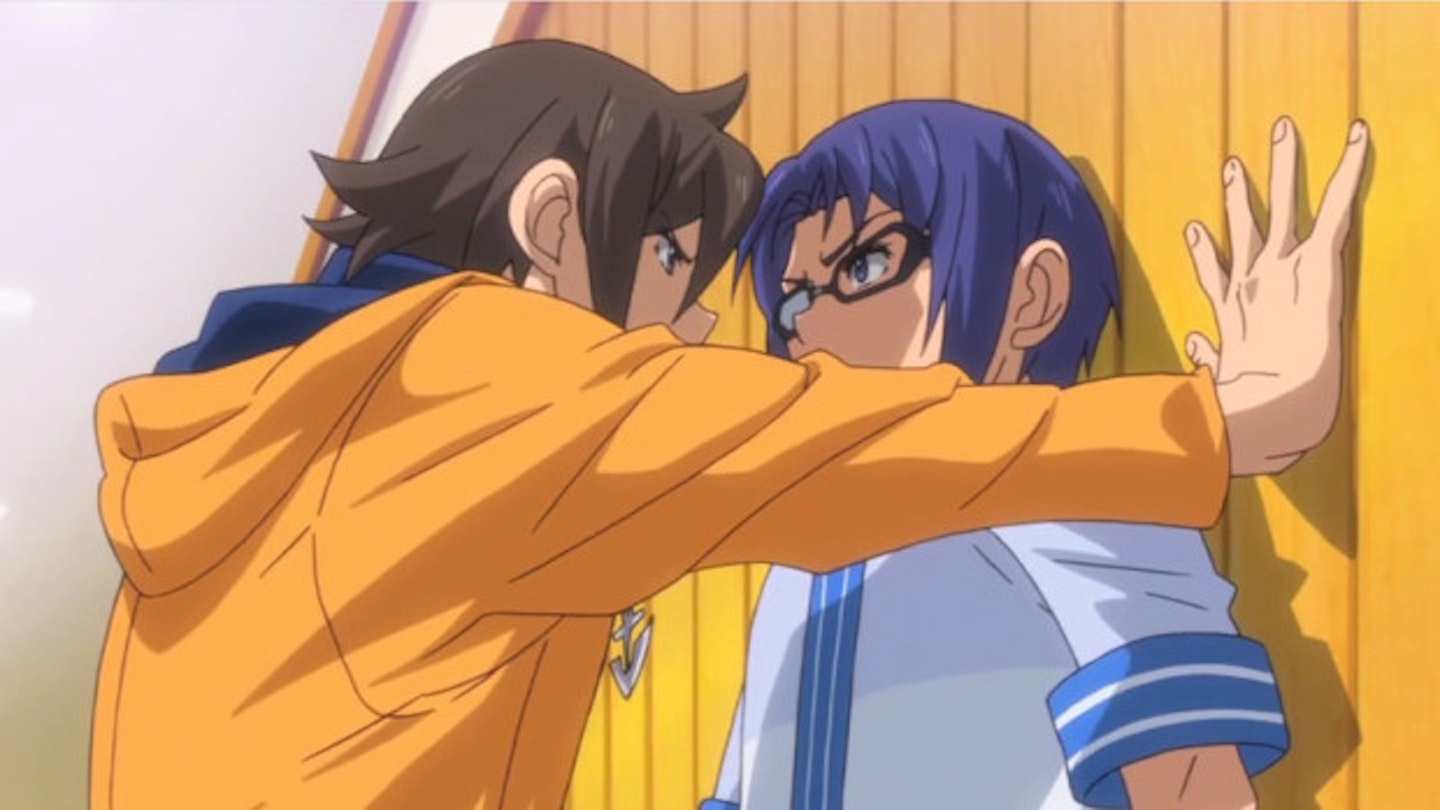Kabedon Is The New Japanese Mating Ritual You Need To Know About (original) (raw)
The pop culture craze sweeping Japan? Hitting the wall next to someone. Often women. But is it as sinister as you'd think?

We all know – only too well – the dazzling techniques British guys often use to get women’s attention. The awkward chat-up line. The wing man. The drink sent surreptitiously across the bar. But in East Asia, men have been adopting a rather more unorthodox approach of late: to win fair lady, the modern Asian lionheart unleashes his kabedon – by slamming his hand against a wall.
Yup. Originating in Japan, the bizarre phenomenon of kabedon – kabe means wall and don is the thud of someone hitting it – is the latest pop culture sensation to sweep the region.
The manoeuvre first became popular last year through a shojo manga (cartoons marketed to a teen girl audience) called L', where the male lead corners his love interest against a wall using his arms. Both frightened and aroused, her large, starry anime eyes light up and her cheeks turn a hot shade of pink.
It didn’t take long before kabedon turned into the top anime buzzword in Japan, spreading like wildfire into mainstream media and even retail. If you’ve been anywhere in East Asia recently, chances are you saw one form or another of kabedon in ads, TV, movies or magazines. Japanese instant noodle company Nissin featured the pose in its TV ad while Domino’s Pizza in Japan distributed ‘kabedon coupons’, which gave discounts to customers who performed kabedon on the delivery person. There was even a pop-up kabedon café in Tokyo last year, where women would go to get ‘kabedoned’ by a specially-made doll that’s supposed to be half Japanese and half French.
The pose even made it to the political sphere this January, when Japan’s Tokyo Newspaper featured a satirical cartoon of Japanese Prime Minister Shinzo Abe kabedon-ing Korean president Park Geun-hye. In Korea, a country still smarting from historical grievances toward its neighbour, the joke proved far from seductive.
So what exactly prompted all this raffish wall pounding? To people outside the region, kabedon might seem random and straight up weird. But looking at the context of the ‘fashionable male’ trends that preceded kabedon, it kind of makes sense. There was the ‘herbivore man’ (otherwise, rather unfortunately, known as ‘grasshoppers’), who was cultured and stylish, but lacking in brute sexiness and romantic impulse. Astonishingly, in a few large-scale surveys, up to 60% of Japanese men in their twenties and thirties considered themselves ‘herbivores’. In Korea, self-proclaimed grasshopper characters soon became a mainstay of TV dramas and films.
‘After the “grasshoppers” phenomenon, there has been a trend among Asian women to want more aggressive, manly men giving them “tough love”,’ says Sujin Chun, a reporter for Korean newspaper JoongAng Ilbo, who recently wrote a column about kabedon.
This image of the passive, pliable Asian man lacking in virility, is easy to find in Western pop culture, too. We’ve all heard the, ‘Asian man = small penis’ jokes. And don’t even get us started on East Asian men portrayed in Western TV and film. Back in the ’80s, in classic teen flick Sixteen Candles, the character Long Duk Dong was being snubbed by Molly Ringwald after his comically inept inquiry, ‘What’s happening, hot stuff?’ (Accompanied by a gong sound, naturally.) Today, Long Duk Dong’s spirit is alive and well in the character of Han from 2 Broke Girls, whose dorkish, loser charm make him a relentless butt of jokes for the two sassy leads.

Whether it’s the socially-inept nerd or the repressed sexual inadequate, the stereotype of East Asian men has frequently been equally unflattering in Asia and the West. Given all that, it seems almost inevitable that a trend like kabedon would appear soon or later.
Originating in shojo manga, kabedon wasn’t really created to fulfil male fantasies, but to address female ones. In a region where female discussions of sex still prompt puritanical tuts and huffs of embarrassment, the popularity of kabedon may even be a release for young women.
‘I think it’s pretty silly and harmless, especially compared to a lot of the more sinister attitudes that get perpetuated in Asian pop culture,’ says Ben Applegate, an editor at Penguin Random House working on manga. 'There’s obviously an element of physical domination. But the context it appears in is always one of female fantasy, especially in shojo manga.’
But in treading a fine line between violence and lovable bad-assery, kabedon has drawn as many critics as admirers. Sure, it’s a silly cartoon thing, but does it convey a perverted view of what is sexy, suggesting that women just can’t resist being frightened and dominated?
That would certainly be the perception to many here in the UK. Although, a far cry from rape fantasies, the notion that women should cherish a frisson of fear from their partner is perhaps at the heart of what can feel unsettling about elements of Japanese pop culture. To many of us here, kabedon might seem less an exhilarating act of seduction, and more a way for Mr Wall Slammer to get pepper-sprayed.
But here’s the thing: even in the West, the ideas behind kabedon may be nothing new. From Robert Redford cornering Meryl Streep in Out Of Africa and telling her, ‘Don’t move,’ to Robin Thicke singing, ‘Push you up against the wall, turn you out and turn you on,’ kabedon has close cousins in Western pop culture. That may or may not make it OK, but it does suggest that kabedon has more stubborn roots across cultures than we might like to admit.
Just as the more erotic submissive/dominant fantasy in Fifty Shades Of Grey sparked hysteria among housewives a few years ago, kabedon, in its kooky, Hello Kitty way, has provoked a similar response among Asian girls. Grasshoppers or wall slammers? Hmm. I’ll be holding out for something in between, thanks.
Like this? You might also be interested in...
Mukbang: Korea Takes Instagramming Your Food To Another Level
Korean Fashion Is The Next Big Thing
Female Inmates Escape Brazilian Prison As Their Mates Seduce The Guards
Follow Jainnie on Twitter: @JainnieCho
This article originally appeared on The Debrief.
Just so you know, we may receive a commission or other compensation from the links on this website - read why you should trust us